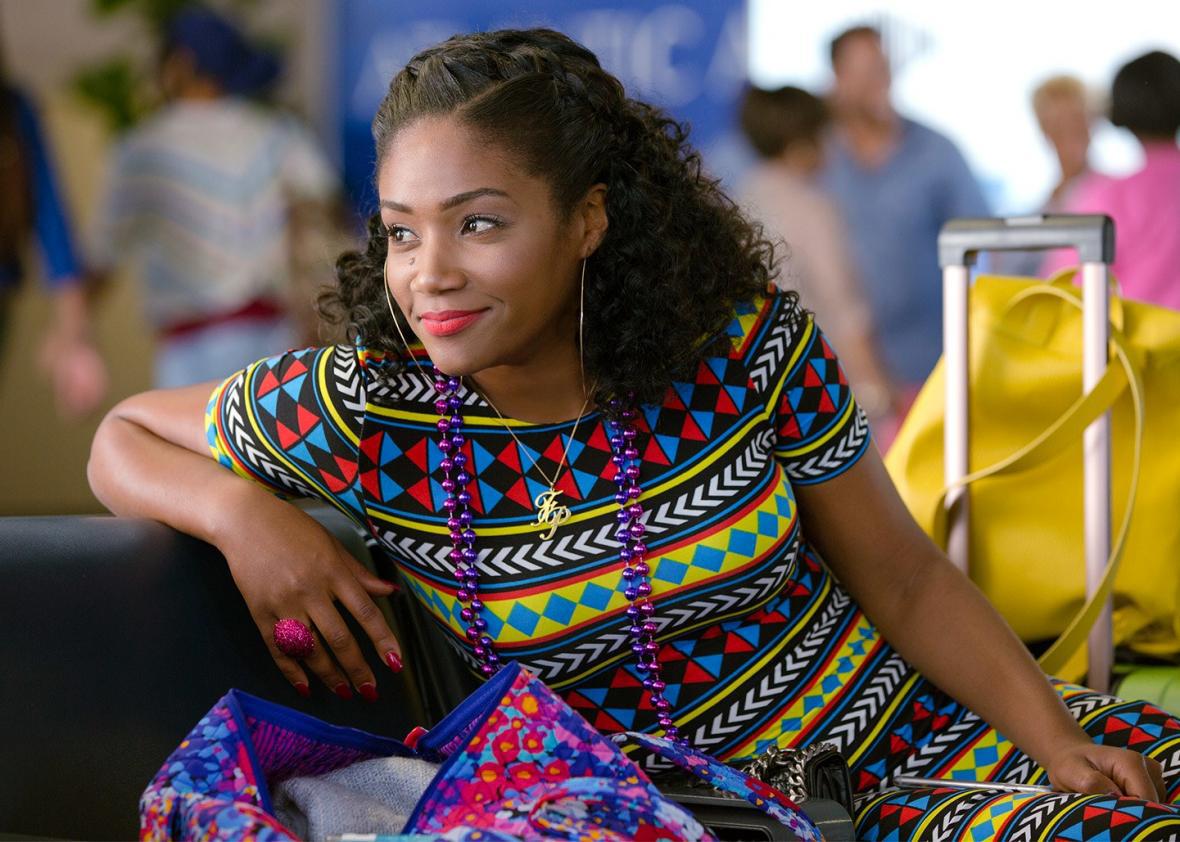When Girls Trip came out this summer, the undeniable standout, absolute highlight of a film overflowing with talent and star wattage was Tiffany Haddish. Up to that point, the stand-up comedian’s biggest on screen roles had been as Jordan Peele’s love interest in Keanu (where singer George Michael turned out to be the unwitting breakout star) and as a supporting character on the criminally underseen and recently canceled The Carmichael Show. But her performance as the brash, flirtatious, ride-or-die bestie Dina brought Haddish an entirely new set of fans and admirers. “You cannot take your eyes off Haddish when she’s onscreen,” Emily Yoshida wrote in her review at Vulture. IndieWire’s Kate Erbland praised her “masterfully delivered” one-liners. Peter Travers somewhat awkwardly deemed her a “Category 5 hurricane of laughs” in Rolling Stone. (Maybe not the best reference for a movie set in New Orleans, but still.)
Haddish’s is the kind of late-career, ostensibly out-of-nowhere rise that awards-season voters often like to acknowledge with nominations and, occasionally, awards: The character actor who’s spent years shining from the sidelines, until suddenly, she lands upon the perfect role and vehicle with which to showcase the range of her talents and finally reach a mainstream audience. They don’t just “break out,” they wrestle the spotlight away from the bigger names and elevate the movie to heights it might never have reached otherwise—like Melissa McCarthy’s boisterous, scene-stealing (and Oscar-nominated) performance in Bridesmaids. So as the race heats up, why is Haddish’s name nowhere to be found in the conversation for Best Supporting Actress? Her performance currently doesn’t crack the top five of any Gold Derby prediction experts for the category, or on other prominent prediction lists.
But it should be. What Haddish does in the raunchy female-centric blockbuster is not at all easy to pull off. Dina is a foul-mouthed, newly unemployed troublemaker who loves to have fun but is also prone to violent outbursts. She’s college-educated but still unabashedly ’hood in her loud outfits and overly physical mannerisms. A decade ago, a character like her would’ve sprouted a garden of think pieces and handwringing about the long history of representation of black women as loud, no-nonsense, and mean, the fictional equivalent to the Tiffany Pollards and NeNe Leakes of the reality TV world.* Even without all that historical baggage to contend with, a lesser performer would’ve made the character one-note—always on 11 with no let-up, mugging for the camera. But in a world where there’s a wider range of black femininity to be found than before, Haddish makes Dina work as more than just a singular, walking collection of stereotypes. Her delivery of lines is truly unassailable, whether she’s demonstrating “grapefruiting” (“Oh, this is tickling my throat, ha ha!” she squeals, in an adorable little old lady voice) or revealing where she’s stashed her weed for the plane trip to NOLA (“It’s a booty hole!”). And even in the silliest of moments—and there are so many silly moments—she always remains grounded and fully realized. Yes, she’s wild, loose, and very immature, but she also loves her girlfriends, and will do anything for them, including break a wine bottle and lunge after your best friend’s lying, cheating husband. Haddish never loses sight of this, and clearly loves Dina, without judgment.
Nowhere are all the shades of Dina more apparent than in Girls Trip’s climactic blowout, when the long-festering tensions between the Flossy Posse boil over into a drag-out fight. Haddish serves up Dina’s savage dressing down of her best friends with just the right bit of dramatic and comedic flair: Her relished unfurling of the word “bee-itch,” the instantly recognizable hand claps for emphasis (in reference to “the clap,” natch). The three times she goes to leave in anger, only to turn right back around and give Ryan (Regina Hall) back the items she somehow got a hold of. (“Take your card! And YES. I maxed that mothafucka out, with yo’ LOW-ASS balance!”) Her palpable anger and hurt over watching her friends make terrible life decisions. It’s a tour-de-force moment, the kind of scene they’d play immediately after they announced you as one of the nominees for Best Supporting Actress on awards night. (In her case, half of it would be bleeped out, but that’s OK.)
There are really excellent performances being buzzed about this year, and at the moment, it seems like Laurie Metcalf is a shoo-in for the category for her deft performance as Marian in Lady Bird. But Haddish’s role is every bit as nuanced and multilayered as Metcalf’s, even in an R-rated comedy that finds its leading ladies pissing uncontrollably all over an unsuspecting crowd while zip-lining in the middle of the Big Easy. When I went to my screening of Girls Trip before the movie’s release, the older man sitting next to me turned and asked who he had just seen popping off the screen—“She was astounding,” he said, in awe. After I told him who she was, he followed up with something along the lines of her being deserving of an award.
He was on to something, I think. As voters from the major organizations begin to cast their votes—the New York Film Critics Circle, whose awards will be announced Thursday, SAG, and so on—they should not forget the joy, verve, and comedic skill that Haddish brought to Girls Trip and help build momentum for an Oscar campaign. She deserves to at least be in serious consideration. And just think: The more Tiffany Haddish campaigns, the more likely we are to get her wacky, amazingly hilarious stories like the time she took an out-of-touch Will and Jada on a Groupon swamp tour. Awards season will be infinitely more delightful, just like everything Haddish is involved in.
*Correction, Nov. 30, 2017: This post originally misspelled NeNe Leakes’ last name.
